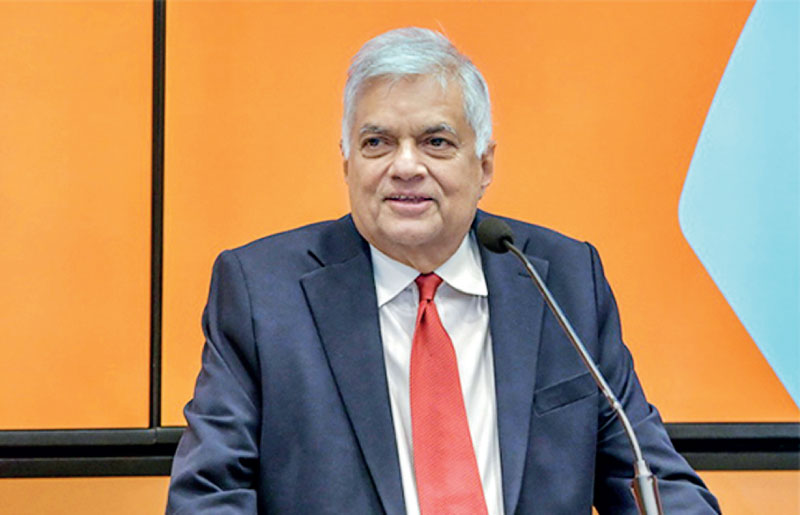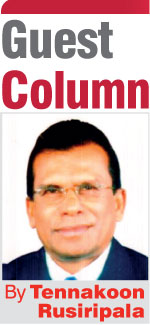Saturday Feb 28, 2026
Saturday Feb 28, 2026
Wednesday, 7 August 2024 00:24 - - {{hitsCtrl.values.hits}}

While it is too far-fetched for us to imagine reaching Indian standards, it consoles us to see RW taking some such initiatives in the current context under all odds he is handicapped with
 Sri Lankan electors are awaiting a change from the status quo of a sluggish and slow-moving economy towards a more seriously planned progress. With fresh memories of extreme hard time sufferings of the recent past, only palliatively handled with haphazard responses to meet emergency situations, the body politic is hopeful of a dawn of an economy progressing under a planned pursuit of a clear vision.
Sri Lankan electors are awaiting a change from the status quo of a sluggish and slow-moving economy towards a more seriously planned progress. With fresh memories of extreme hard time sufferings of the recent past, only palliatively handled with haphazard responses to meet emergency situations, the body politic is hopeful of a dawn of an economy progressing under a planned pursuit of a clear vision.
The society is going through a period of many uncertainties with a serious inequality growing and the economy slogging before heavily indebted consumers failing to fuel its forward movement with very low spending capacities. A large segment of the people is still living either well below the poverty line or marginally there. The majority are in a state of heavy deprivation. The country is yearning for a change, the priority of which should be on boosting economic growth and social well-being focusing on the need to mean the worse affected.
Paradigm shift
Our political history is full of bad experiences. If we continue to be engrossed and imprisoned in the same tradition without attempting to create a new thinking pattern treating the past lessons only as a historical treasury, (instead of an arena for battle) we will fail to effect any change from the status quo. What is badly needed is a paradigm shift in the economic landscape with new thinking. This paves the way for rethinking on the urgent need for changes in new directions. The hard truth is that it is the acute poverty of economic thinking that has brought about the current poverty of the economy.
Let us take a look at our situation, the needs and the way forward. A crisis is the foundation for innovations. Many consider that the shocks, shortages and hardships bear an accent on the need to change, explore and innovate new paths in a high priority. We badly require an effective enabling of policy to improve the institutional system which had remained dogmatic and outdated throughout several decades.
Adaptability of the leaders to new conditions in this global economy which dominates all aspects of economic development anywhere is another crucial factor. The creation of an environment for knowledge-sharing and networking for correcting past failures is a must. In other – words there is a need for a serious focus on effecting a policy change to reverse the inapt interventions of the previous regimes identifying and acknowledging that they have contributed to ruin the development potential of the country.
Now we have a big issue before us at this moment to choose among several contenders as to who is committed and most suited to achieve those. We haven’t seen any new or proven entity in the fray who could be befitting to be categorised as a super choice. While I am no body to pass judgement or to prescribe on any, I will only state that the devil is as detailed and all will know the details better than me.
No other option
Left with no other option, we are compelled to scrutinise among the lot as to who has the potential to adapt to the changing circumstances. The choice remains confined to choose between an entirely new runner or let a person who has shown more adaptability and provided some degree of consolation to the people, to carry forward the task. The consolidation efforts we have already witnessed serve as an example of the direction taken on new dynamics of economic growth.
The heavy criticisms levelled by the opponents based mostly on popularist grounds, were disregarded by Ranil and his followers justifying with economic needs to keep pace with the Global Sustainable Economic Development Goals. It is not difficult for anyone to accept that economic stability cannot be established without strong policies. It is also important for us to recognise that we cannot move forward in isolation from the global concepts.
The recent Economic Transformation Proposals presented to Parliament are very much in a liaison with the widely accepted global strategies to achieve the goals fixed by the nations in global forums. This approach in ‘Ranilonomics’ is in extreme contrast to what is being prophesied by his contenders. No change is possible without venturing into experimenting and adapting to circumstances. This is a positive aspect the electors witness in the ongoing economic scenario which stands in favour of Ranil.
Having moved out from colonialism, Sri Lankan politics remained imprisoned in political dynasties and we are now moving in a new direction to see the rising stars of the new generation. This generation which is yet to emerge with some degree of maturity will have no declared positions for them to defend. They contemplate new options as against the conservative establishments. They have to think of what is in store for them in a few years with the rapid changes the societies are undergoing with the technological changes. They will be saddled with more problems than solutions due to high-tech evolutions. The job opportunities they have today would be gone in the 2030s and the youth of today will have to be prepared to face a situation unforeseen.
New creative thinking
Hence no regime which is not ready to change with the world will have a chance to survive. Those talking and arguing only about bygones will have to let them be bygones instead of struggling to harp on those. New creative thinking even as adaptations would contribute to attract the new generation much faster.
There are many examples for us to follow. We saw how the oil shocks lead to innovative thinking about renewable energy options. How China moved into a market oriented economy. More than anything the most recent revolution in India under Prime Minister Mody. Under the tenets of ‘Modinomics’ many inapt applications introduced into Indian economy ruining it were changed by Modi in a short time with the highly effective rekindling of the dynamic growth which unlocked the development potential of India. Having dispensed with the longstanding Prime Ministers Economic Advisory Council and abandoning few other National Councils he did not appoint a professional economist in his office and replaced the National Planning Commission with a NITI (National Institution for Transforming India). All these changes have brought about a revolutionary change in the Indian Economy making it rank high among the other leading nations.
While it is too far-fetched for us to imagine reaching Indian standards, it consoles us to see RW taking some such initiatives in the current context under all odds he is handicapped with. This is the indication of a distant light in the tunnel for Sri Lankan polity to explore.